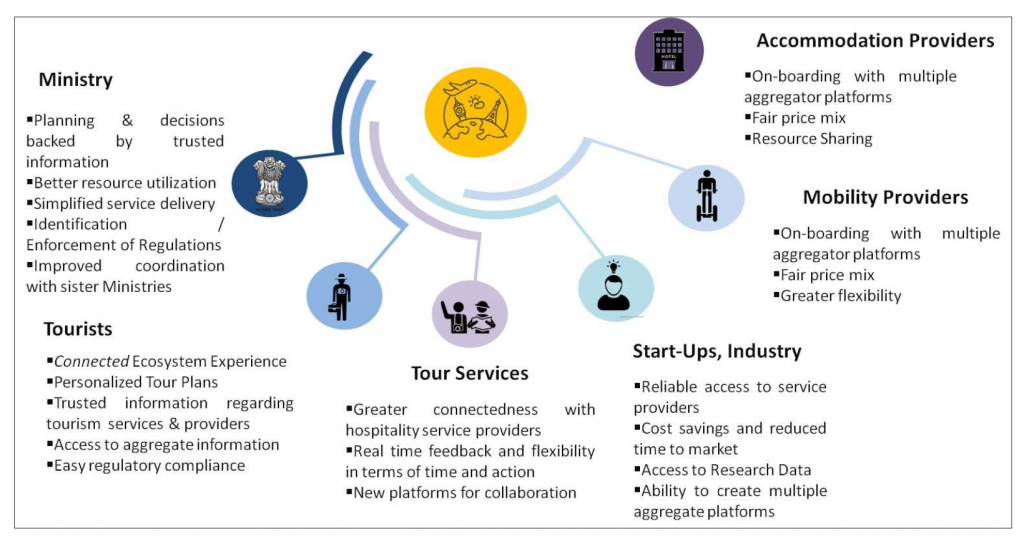Digital Transformation in the Indian Tourism Industry
Tourism Industry- much more than creating memories
Posted On
15.12.2023 13:47

All about the Industry
At a micro level, Travelling is an adventure filled with excitement and exploration and a chance to create enduring memories. But at a macro scale, Tourism is recognized as an economic activity because of its ability to bring in large amounts of revenue in the form of payments towards the goods and services by the tourists. By tourists, we not only mean the individuals traveling for leisure but also the businesses and corporations that travel for meetings, trade fairs, conventions and conferences, exhibitions, etc.
Tourism has direct effects on the social, cultural, educational, and economic sectors of national societies, and on their international relations. Globally, travel and tourism's direct contribution to gross domestic product (GDP) was approximately 7.7 trillion U.S. dollars in 2022. Let’s not forget that these are the during covid 19 numbers (Statista). The World Travel & Tourism Council (WTTC) has predicted that this, which suffered a significant blow amid the COVID-19 pandemic, has made a remarkable recovery and is expected to generate $10 trillion by the end of 2023. (CNBC)
India’s Vibrant Tourism Canvas
Let’s take a look at India’s tourism industry. India is geographically diverse and offers a variety of cultures that come with its own experiences, making it one of the leading countries in terms of international tourism expenditure. As per IBEF’s report on the Growth of the Tourism and Hospitality Industry, Travel and tourism is one of the largest industries in India, with a total contribution of about US$ 178 billion to the country’s GDP. (Statupindia.gov).
The industry that brings in so much economic support around the world, Digitalisation has truly reshaped it for travelers, businesses and government; it’s faster for travelers to organize trips, for organizations to track people’s preferences and personalize offers for an enhanced experience and for the government to expand employment opportunities and track and generate higher foreign exchange.
As per 2022 data, 68% of global travel and tourism sales were made online and by 2026, this number is predicted to go up to 73%. (techreport). The total Indian Travel market made up to US $19.1 billion in 2021 and is expected to reach $40.4 billion by 2025 with online penetration of 58%. (startuptalky).
Digitalization: A Game Changer
Looking at such data it is only natural for the Indian Tourism Industry to quickly adapt to the change to keep attracting tourists to the country. Some of the top digitized solutions that can be provided for the tourism industry are Booking Applications, Travel Search Engines, Virtual Guides, Financial Planning Applications, Transit Applications, etc. There are over 1500 startups in the Tourism industry making efforts to digitize the industry. The tourism industry for startups is competitive but lacks dominant players in the market. Hence, the scope of innovation in the industry is higher. Some of the applied examples of the digitalization in the tourism industry are below:
Building on Virtual Technology: The use of Virtual Technology can completely transform the travel experience for tourists. The “Dekho Apna Desh” initiative by the Ministry of Tourism is an amazing example of the use of Virtual Technology. The initiative offers virtual tourism, safari tours, museum and art gallery tours, etc. Startups can take this technology forward by partnering with universities and businesses enabling them to make better and faster decisions on further education or investments.
Art of AI Personalisation: AI is poised to be a force of change, hyper-personalising traveler experiences, and operational efficiency, empowering employees, simplifying logistics, and more. Yet, just 13% of the travel companies have the AI maturity to unlock the industries’ full potential. (Source: Accenture) Some of the top use cases of AI in the travel industry can be:
- AI for travel agents- Westjet uses Juliet Virtual Assistant.
- AI for optimizing operations- KLM Royal Dutch Airlines driving growth for the airline
- AI for personalization- Booking.com, and Tripadvisor personalized offers
- AI for baggage handling- Bags ID technology
Machine Learning: The technology takes the massive information available today, polishes it, and uses it to predict the future to meet the goals of the company. For example, hotels can extract data from three sources: Property Management Systems, Big data and manual inputs. Travel agencies can use bots and add to their website to provide personalized services and customer support.
It is not just the private sector but also the Government of India that has put in tremendous efforts to digitize the industry. With the launch of the National Tourism Digital Mission, the government aims to create a Unified Tourism Interface that enables the exchange of data among various stakeholders of the tourism ecosystem.
Benefits of the NTDM (source: tourism.gov)

Things get even more interesting in India when both the startups and the government join hands to take the industry forward. In August 2023, MakeMyTrip, one of the leaders in industry joined hands with the Ministry of Tourism to launch a unique traveler’s map of India that showcases more than 600 destinations that are not so popular but unique and treasured in the country. (Source: Modern Intelligence)
Digitising India’s travel realm presents opportunities along with hurdles. Issues like uneven internet access, worries about data breaches, and complex payments make digital travel a bit tricky. Yet there’s a silver lining. Working with global partners, using smartphones and improving travel facilities improves chances of growth. Within the Indian landscape, these challenges cast their shadows and opportunities present gateways for the digital sector to pivot challenges into innovation hubs, fostering growth, technological evolution and enhanced user experiences.
Appvista’s Example of Digitising Tourism:
Addressing the surging demand, Appvista paves the way for travel companies to excel in the digital era. Appvista made it easier for businesses to travel and book the heritage locations of a country. The entire focus of the project was to generate more foreign revenue by easing the process of booking. A reliable website was backed by the government was built which used sharepoint technology. Check out the Our Work for more details
For an optimal experience, please
rotate your device to portrait mode.